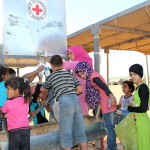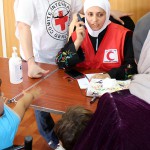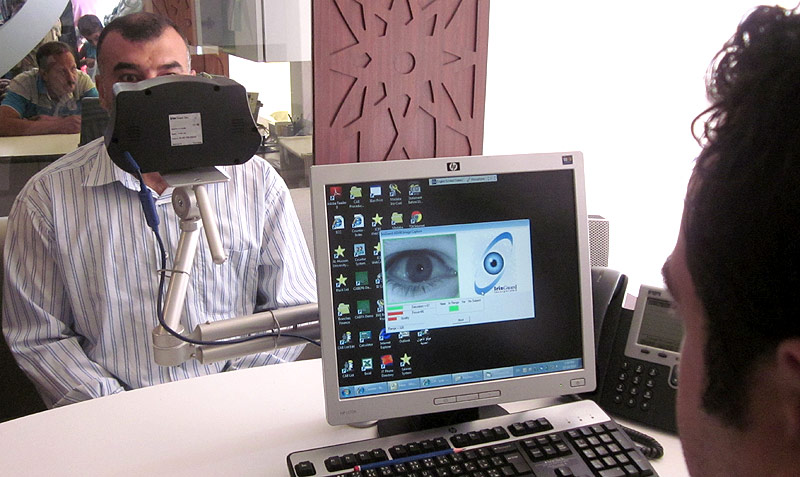With no solution to the Syrian crisis in sight, people are still crossing into Jordan in search of a safe haven. Many are impoverished and struggle to meet their daily needs. The ICRC is providing them with food, water, basic health care and other aid.
Most Syrian refugees cross into Jordan through the north-eastern border, where they are met by Border Guard Forces and then accommodated at one of six ICRC-supported temporary transit facilities. The ICRC has equipped the facilities with shelter caravans and tents, sanitation caravans, water dispensers and diesel generators, and made available primary health care by providing medical supplies to local authorities.
“The vast majority of refugees undergo an exhausting journey to reach Jordan,” said Catherine Gendre, head of the ICRC delegation in Jordan. “Providing basic necessities such as water, food, shelter and health care – when needed – has been our priority in the north-eastern border area.”
Refugees normally stay from two to three days in the transit facilities before they are taken to Raba’a Al Sarhan Registration Centre in the northern governorate of Mafraq; from there they are sent to one of the refugee camps set up in Jordan to host Syrians.

Jordan. ICRC provides drinking water to Syrian refugees in Hadalat transit facility on the north-eastern border.
/ CC BY-NC-ND/ICRC/A. Sari
The ICRC recently began to provide health screening and clinical services for refugees at Raba’a Al Sarhan to help identify those who require immediate care before being transferred to the designated refugee camps.
From May to July, the ICRC:
- sponsored about 520,000 meals for some 30,000 Syrian refugees temporarily in four transit facilities in the north-eastern border area, and also around 150,000 biscuit bars and nearly 40,000 packs of juice for newly arriving refugees. In addition, it delivered almost 47,000 bottles of water, 200 blankets and some 60,000 hygiene items such as soap, diapers and sanitary pads to the facilities;
- provided some 2,000 Syrian refugees living in host communities in the northern governorate of Mafraq with monthly cash assistance, as part of a programme implemented with the Jordan National Red Crescent Society;
- provided cleaning services for 33 pre-fabricated shelter caravans and 35 tents used to accommodate Syrian refugees and 11 pre-fabricated sanitary facilities in four transit facilities in the north-eastern border area and in Raba’a Al Sarhan Registration Centre in Mafraq governorate;
- provided 84,000 litres of water per day to Hadalat, Rukban and Bustana transit facilities in the north-eastern border area;
- installed three pre-fabricated caravans for the health facility in Raba’a Al Sarhan Registration Centre in Mafraq governorate;

Jordan, Mafraq. With Jordan Red Crescent Society volunteers, the ICRC helps Syrian refugees in the Zaatari camp maintain contact with family members inside Syria and elsewhere by making telephone calls.
/ CC BY-NC-ND/ICRC/A. Sari
- provided 84,000 litres of water per day to Hadalat, Rukban and Bustana transit facilities in the north-eastern border area;
- installed three pre-fabricated caravans for the health facility in Raba’a Al Sarhan Registration Centre in Mafraq governorate;
- helped 7,450 Syrian refugees in the Zaatari camp maintain contact with other family members inside Syria and elsewhere by making international telephone calls available to them with support from Jordanian Red Crescent volunteers;
- provided the Jordanian Royal Medical Services with basic medicines for children, wound-dressing materials, other basic medical supplies and equipment for use in the treatment of Syrian refugees entering Jordan from the north-east border;
- organized a seminar on war surgery in Amman for 33 doctors from the Royal Medical Services and the Ministry of Health to share views on how to deal with weapon-related injuries
- held 19 basic first-aid training sessions for around 640 Syrian refugees in the Zaatari camp, in addition to two emergency medical service workshops for 52 participants from the Civil Defence Department;
- provided the National Committee for Demining and Rehabilitation with financial support for a programme designed to raise awareness among Syrian refugees currently residing in northern Jordan of the risks posed by unexploded ordnance and other remnants of war;
- organized a two-day training session in Amman for members of Syrian armed groups to boost their understanding of international humanitarian law;
- funded the training of 68 needy Syrian and Jordanian women in hairdressing, computer skills, sewing, basic first-aid and awareness of sexual violen ce at the vocational training centre of the Jordan National Red Crescent Society.


